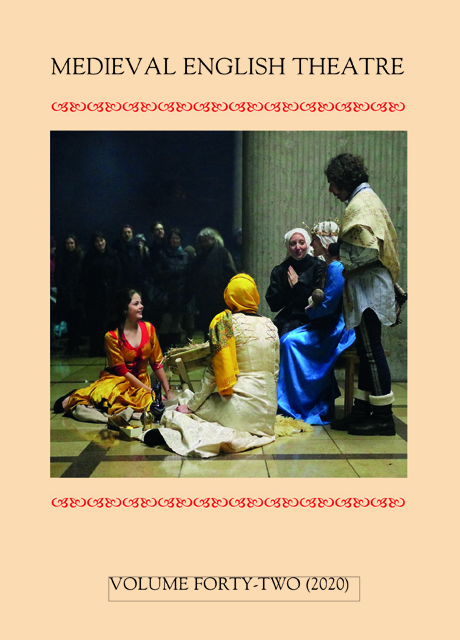Book contents
- Frontmatter
- Contents
- List of Illustrations
- List of Common Abbreviations
- Editorial
- Introduction: Reflections on the Medieval Convent Drama Project
- Fragments of Four Fourteenth-century Miracle Plays from Mont Saint-Michel
- Performing Female Authority: Convent Plays and Lay Spectatorship in the Barking Abbey Elevatio and Visitatio Sepulchri Dramatic Ceremonies
- Women in Religious Guilds: Performance and Community in Medieval and Tudor England
- When in Doubt: Thomas Indie and the Mid-sixteenth-century Reception of the Towneley Collection
- Taʿziyeh-khani in Iranian Communities: Muharram AH 1439 (AD 2017)
- Editorial Board
- Submission of Articles
When in Doubt: Thomas Indie and the Mid-sixteenth-century Reception of the Towneley Collection
Published online by Cambridge University Press: 17 January 2023
- Frontmatter
- Contents
- List of Illustrations
- List of Common Abbreviations
- Editorial
- Introduction: Reflections on the Medieval Convent Drama Project
- Fragments of Four Fourteenth-century Miracle Plays from Mont Saint-Michel
- Performing Female Authority: Convent Plays and Lay Spectatorship in the Barking Abbey Elevatio and Visitatio Sepulchri Dramatic Ceremonies
- Women in Religious Guilds: Performance and Community in Medieval and Tudor England
- When in Doubt: Thomas Indie and the Mid-sixteenth-century Reception of the Towneley Collection
- Taʿziyeh-khani in Iranian Communities: Muharram AH 1439 (AD 2017)
- Editorial Board
- Submission of Articles
Summary
Considering theatre in the light of its effects on the community, its manifestation within the community or the way in which the community has in turn shaped theatre is undeniably central to our appraisal of the genre. However, many early dramatic texts elude such appraisals because we simply do not know when and where they were performed, by whom, for whom, on what occasion, or in which material circumstances. We are left with texts that have been orphaned from their context, which scholars seek to retrieve and restore, grappling for the most minute clues. One of these elusive texts is undoubtedly the Towneley collection of biblical plays, not only because its contexts of production and reception are unknown but because several differing theories concerning the original recipient community of these plays have been proposed (and accepted to varying extents) over the years, only to be mostly questioned and partly invalidated. The Medieval English Theatre society, in its meetings and its journal, has in fact borne witness to the successive developments of the Towneley mystery and has most recently made the more sensible proposition that we should, first and foremost, acknowledge our lack of knowledge. At the society’s 2015 meeting Garrett Epp indeed presented a paper entitled ‘Things we can no longer say about the Towneley Plays’.
Dismantling some of the most widely accepted or circulated assumptions about the Towneley collection has proved somewhat of an uphill battle for specialists, especially in the absence of tangible evidence to act as a substitute. As much as we all like to have a concrete point of origin to our most beloved pieces of literature, Barbara Palmer, Meg Twycross, and Garrett Epp (among others) have provided ample grounds to question the most widespread ‘givens’ about these plays. To mention just those assumptions that appear as introductory facts in old as well as some recent Towneley scholarship, it must be stated, at the onset of this article, that the thirty-two plays contained in San Marino, Huntington Library MS HM1 are not the production of Whalley Abbey: many revisions post-date the dissolution of the monasteries, and there are too many sources and stages of rewriting for one coherent point of origin to be clear.
- Type
- Chapter
- Information
- Medieval English Theatre 42Religious Drama and Community, pp. 115 - 141Publisher: Boydell & BrewerPrint publication year: 2021



